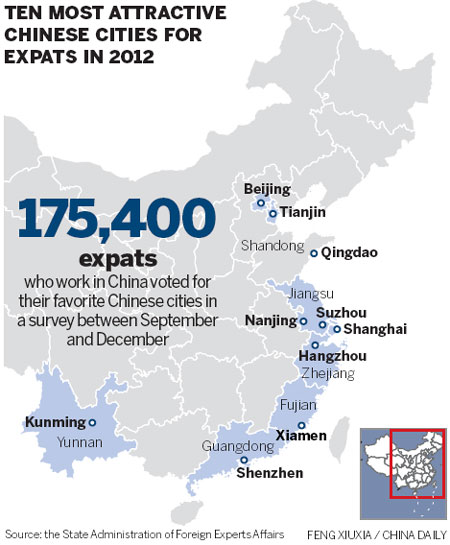Expats prefer Beijing, Shanghai
Updated: 2013-04-11 07:58
By Chen Xin in Beijing and Xu Junqian in Shanghai (China Daily)
|
||||||||
|
Pupils whose parents are foreigners write Spring Festival couplets with their classmates in Wu'ai Primary School in Yiwu, Zhejiang province, in January. About 500 children of expats live and receive education in the city. Zhang Jiancheng / China Daily |
The living environment has become a growing concern for expatriates working in Shanghai and Beijing, although the two cities topped a list of the most attractive Chinese cities for expats, a new study found.
The survey - 2012 Amazing China, conducted between September and December by International Talent, a magazine under the State Administration of Foreign Experts Affairs - gauged views of 175,400 expats working in China about their favorite Chinese cities.
Among those expats, 1,050 were surveyed about their opinions on the policy, administration, and working and living environments of their cities.
Shanghai and Beijing were topped the list, followed by Shenzhen, Suzhou, Kunming, Hangzhou, Nanjing, Tianjin, Xiamen and Qingdao.
In Shanghai and Beijing, their living-environment scores were lower than those of other cities, said Zhang Xiao, who was in charge of the survey.
Cities such as Suzhou, Kunming and Hangzhou received comparatively high scores in living environment, and that helped boost their rankings, she said.
Despite topping the chart for three years, Beijing and Shanghai underperformed this time in living environment as foreigners living in these two cities have complained about the worsening air pollution, according to the survey.
The smog-shrouded sky over Beijing is discouraging expats from staying longer and scaring away others who would otherwise love to visit, work, and live in the city, the study showed.
"Recruitment has become difficult as the number of foreigners who are applying for teaching positions in Beijing has decreased by at least half compared with the same time last year," said Yang Sha, general manager with Angelina International Placement Service in Beijing, which specializes in hiring foreigners to teach languages in schools in China.
"Air quality is absolutely the main reason," he said.
All four foreign staff members in Yang's company left Beijing this year because of the smog.
One left for the southern city of Xiamen, Fujian province, and the others went back to their home countries, Yang said.
Elisabeth Anderson, a Swede who works in Beijing, said a Swedish friend of hers just left Beijing because of the air quality.
Anderson said her friend had spent most of her time working in Beijing during her 10-year stay in China.
"She has contracted a lung disease, so she is worried that a longer stay will make the illness worse," she said.
Rhio Zablam, from the Philippines, works at a media firm in Beijing. He married a Chinese woman in 2011, and they had a baby in February.
"My wife and I are worried about the air pollution in Beijing because it might be harmful to the growth of my baby," the 34-year-old said. "Although the smog does not occur every day, I have not yet brought my baby out of the house till now."
Zablam said he plans to buy an air purifier as many of his European friends in Beijing have done.
Zablam said he hopes the government takes concrete measures to clean up the air.
"Our foreign colleagues have concerns about Beijing's air quality when they are asked to make a business travel to the capital," an employee of headhunter Adecco Description's Shanghai office said, speaking on condition of anonymity.
"Shanghai is definitely my favorite Chinese city," said William Hatcher, who has been living and working in the metropolis for about two years, after living in Changsha, Hunan province, for two years. Hatcher said the difference between the two cities is like "day and night".
Hatcher, a 25-year-old English-language teacher from the United States, said the best part of Shanghai is the variety of food, culture, people and places to go, while the disadvantage is dealing with the bureaucracy when applying for things like visa renewals.
"It's tolerable, but can be frustrating," Hatcher said.
He said he is not worried about the environment problems, adding: "After all, they are not as bad as in Beijing."
But for James Eron, a US citizen and father of two girls, air pollution and food safety have been the biggest worries related to his girls' health. And his solution is having air purifiers in his house and trying to eat organic food and at well-known places.
What appeals most to the 43-year-old entrepreneur, who now owns a cloud computing and server operations company in Shanghai, is the "multiculture" of Shanghai, which has people from different places.
The survey by International Talent magazine also found that among the 1,050 foreign professionals surveyed, 30 percent plan to settle down in China, and most of them are 35 years old or older who have families with them in the country. They prefer to live in cities such as Chengdu and Hangzhou, where they can enjoy better living environments.
Expats also expect more simplified visa procedures and easier access to China's green cards, the survey found.
Contact the writers at chenxin1@chinadaily.com.cn and xujunqian@chinadaily.com.cn
Hou Liqiang contributed to this story.

(China Daily 04/11/2013 page7)

 In Photos: 7.0-magnitude quake hits Sichuan
In Photos: 7.0-magnitude quake hits Sichuan
 Li Na on Time cover, makes influential 100 list
Li Na on Time cover, makes influential 100 list
 FBI releases photos of 2 Boston bombings suspects
FBI releases photos of 2 Boston bombings suspects
 World's wackiest hairstyles
World's wackiest hairstyles
 Sandstorms strike Northwest China
Sandstorms strike Northwest China
 Never-seen photos of Madonna on display
Never-seen photos of Madonna on display
 H7N9 outbreak linked to waterfowl migration
H7N9 outbreak linked to waterfowl migration
 Dozens feared dead in Texas plant blast
Dozens feared dead in Texas plant blast
Most Viewed
Editor's Picks

|

|

|

|

|

|
Today's Top News
Live report: 7.0-magnitude quake hits Sichuan, heavy casualties feared
Boston suspect cornered on boat
Cross-talk artist helps to spread the word
'Green' awareness levels drop in Beijing
Palace Museum spruces up
First couple on Time's list of most influential
H7N9 flu transmission studied
Trading channels 'need to broaden'
US Weekly

|

|








